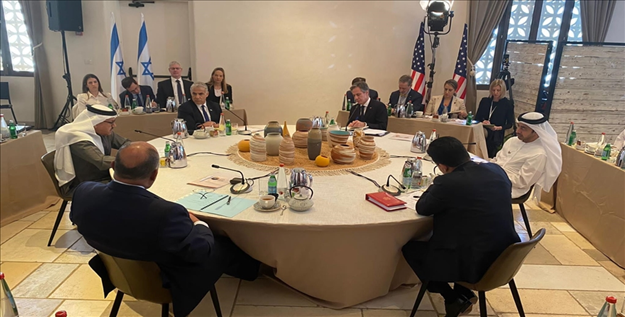
Amid Middle East summit, U.S. allies, including Israel, UAE, Jordan, Bahrain, and even Saudi Arabia that did not join the meeting have showed limited support for Ukraine.
“In this war, Egypt is not — and does not want to become — part of the robust Western defense of Ukraine. Biden’s call to defend the larger cause of democracy has zero resonance for Egypt’s al-Sisi,” says Amy Hawthorne, a human rights defender.
Secretary of State Antony Blinken arrived in Israel in advance of a historic meeting of top Israeli and Arab diplomats in the Negev desert on Monday — the latest indication of a realignment of Middle Eastern relations following normalization deals struck two years ago, according a report by John Hudson, The Washington Post’s national security reporter.
However, the rare meeting of Arab countries on Israeli soil — a byproduct of years of coaxing from U.S. officials — coincides with a much less cooperative approach from America’s Middle Eastern allies on the issue of the day: Ukraine.
Blinken has touted the unprecedented support Washington has marshaled from countries opposed to Russia’s war in Ukraine. But on Sunday, he acknowledged that more work needed to be done among U.S. allies in the Middle East — a challenge that could loom over Monday’s meetings.
“We will be talking throughout about various means of support that Israel and other countries can give to Ukraine, whether it comes to security assistance, whether it comes to humanitarian assistance, economic assistance, or, again, making sure that sanctions are implemented,” Blinken told reporters. “That will be a conversation that’s ongoing throughout this trip.”
Israel, the largest cumulative recipient of U.S. aid, has come under criticism from Ukrainian President Volodymyr Zelensky for refusing to provide security assistance to Kyiv or impose sanctions on Russia. “We can ask many times why we’re not getting weapons from you, why Israel hasn’t imposed serious sanctions on Russia. … You need to provide answers to these questions and live with them,” he told the Israeli Knesset last week.
The United Arab Emirates, another key ally, has offered tepid statements at the United Nations Security Council even as the U.S. ambassador to the U.N., Linda Thomas-Greenfield, has equated neutrality to cowardice. “You cannot stand on the sidelines and watch the aggression that we see taking place in Ukraine and say you’re going to be neutral about it,” she said earlier this month.
Saudi Arabia, which is not participating in Monday’s event but considers Washington its most important security partner, has resisted U.S. requests to increase oil production — a move that would help ease the energy crunch and rising prices caused by the hostilities.
Blinken has sought to avoid publicly calling out any individual Middle Eastern ally for falling short on Ukraine and offered praise for Israeli medical teams who are operating a field hospital in Ukraine as Russia pummels population centers with missiles and other artillery. But U.S. officials have made clear they expect more support — especially from Arab governments.
“Washington has clearly been disappointed by the response of both Saudi Arabia and the UAE because of their lack of support for the position of the U.S. and the West, but also for not breaking with Russia by boosting oil exports,” said Simon Henderson, a Gulf scholar at the Washington Institute.
America’s Gulf partners perceive that the United States is pivoting away from the Middle East — focused on Russia’s aggression in the short term and China’s growing military and economic might in the long term. Their muted response to Russia’s action demonstrates their discontent, analysts say.
For Israel, the situation is more complicated.
“Israel has tried to thread the needle between standing with the U.S. and the West and not angering Russia, which it considers a ‘neighbor’ to its north, with its military presence in Syria,” said Natan Sachs, director of the Center for Middle East Policy at the Brookings Institution.
In practice, that has resulted in Israel’s foreign minister, Yair Lapid, issuing clear, pro-Western statements about the Ukraine conflict, with condemnation of Russia’s actions, while Prime Minister Naftali Bennett has avoided making remarks that might anger Russian President Vladimir Putin.
“This has allowed Bennett to engage in his intensive diplomatic efforts to mediate between Moscow and Kyiv,” Sachs said. “Their approach risks angering Washington, of course.”
In private, U.S. and European officials have also downplayed the prospects that Bennett’s channel with Putin will pay dividends for Ukraine — particularly given their view that Putin is bent on continuing his military campaign.
The meetings Monday include the foreign ministers of the UAE, Morocco, Bahrain, Israel and Egypt.
Egypt, a longtime peace partner of Israel, has looked to seize on the normalization agreements to amplify its role as Israel’s bridge to the Arab world. While that position is welcomed by Washington, Egypt’s Abdel Fatah al-Sisi has also disappointed U.S. officials with his affinity for Putin and refusal to join the West’s pro-Ukraine coalition.
“In this war, Egypt is not — and does not want to become — part of the robust Western defense of Ukraine,” said Amy Hawthorne, an Egypt expert at the Project on Middle East Democracy. “Biden’s call to defend the larger cause of democracy has zero resonance for al-Sisi; what matters is protecting Egypt’s parochial interests without unduly antagonizing Washington. Sisi will do the minimum that Biden asks of him and no more.”
U.S. disappointment in the region stands in stark contrast to its view of how other allies, even in regions where the conflict represents a more remote threat, have stepped up in the wake of Putin’s attack on Ukraine.
Japan, the world’s third-largest economy, froze Moscow’s access to tens of billions of dollars’ worth of its currency reserves held in the central bank in Tokyo. It also joined with other Group of Seven nations and Australia to cut some Russian banks off from a global interbank messaging system known as SWIFT and freeze the assets of Russian officials and elites. It is also targeting individuals and organizations from Belarus.
Other East Asian countries have followed suit. South Korea has tightened export controls against Russia and also joined the SWIFT cutoff of some banks. Singapore, which studiously seeks to avoid crossing the world’s major powers, also imposed export controls on items that can be used as weapons against Ukrainians and blocked certain Russian banks and financial transactions.
Many African countries have been reluctant to take sides in the conflict, wary of angering either the United States or Russia, but U.S. officials have been pleased with the strong criticism of Moscow’s actions at the U.N. Security Council by some, including Gabon, Ghana and Kenya.



